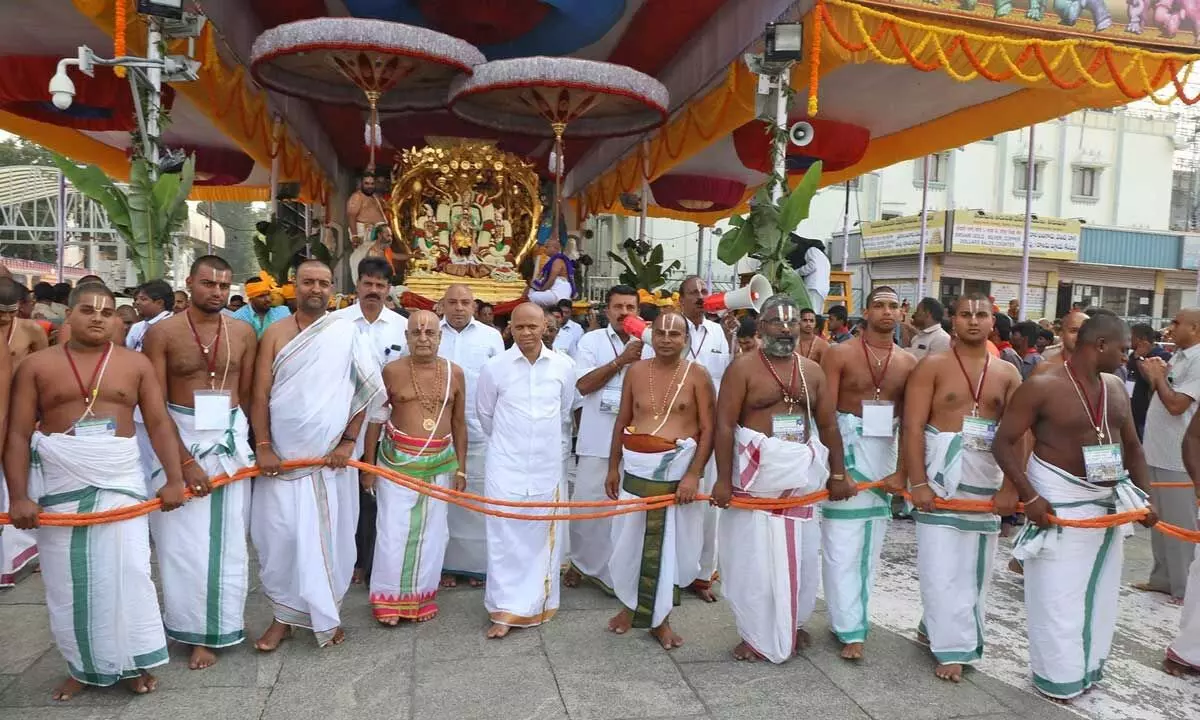Live
- ‘Daaku Maharaaj’ to kickstart musical promotions
- ‘Game Changer’ team teases with a new promo
- Nara Lokesh emphasises overhaul of govt. schools and mid-day meal program
- Amid turmoil, air pollution peaks in Bangladesh as temperatures fall
- Google Trends unveils list of most searched ‘Indian Movies of 2024’
- BGT 2024-25: Hazlewood signals readiness for Brisbane Test after training with full run-up
- Google Presents Deep Research AI Tool for Comprehensive Web Reports
- Share of top 50 stocks to total market cap at all-time low: Report
- Nortje ruled out of SA’s remaining white-ball matches against Pakistan
- Mamata doesn't want INDIA bloc to succeed, claims BJP's Rahul Sinha
Just In

Students and Acharyas at a temple procession
- Sri Venkateswara Veda Vignana Peetham is offering 17 courses including 7 Veda Sakhas, 5 Agama Sakhas, 4 Smartha Sakhas and Divya Prabandam with a total 535 students and 48 faculty
- The students will participate in rituals conducted by TTD during important occasions like annual Brahmotsavams, Pavithrotsavam and Parayanams to provide hands-on experience
Tirumala: With a noble aim to promote Vedas, TTD established Veda Patasala in 1884 which later transformed into Sri Venkateswara Veda Vignana Peetham (SVVVP). Going back to its initial days, the Patasala was started by the then Tirumala Tirupati Devasthanams custodian Mahant Prayag Das (Hathiramji Mutt Head) with three branches only which is now blossomed into a full-pledged Veda and Agama institution. The Patasala over the years shifted to many places including Sampangi Mandapam in Tirumala temple, Vasanta Mandapam outside the temple, Narasingapuram and Kalyani Dam near Tirupati before it found its own place in Dharmagiri on the holy Tirumala hills. TTD later built a new complex in the ancient Gurukula model in a sprawling 35-acre area in the lush green forest, 5 km away from Tirumala shrine to house SVVVP.
The Patasala is now offering as many as 17 courses including 7 Veda Sakhas, 5 Agama Sakhas, 4 Smartha Sakhas and Divya Prabandam with a total 535 students and 48 Acharyas (faculty). Students from the age of 10 with a fifth class pass will be admitted in a 12-year Veda course while those aged between 12-14 year with seventh class for other courses. TTD provides free accommodation, boarding, clothes and books to the students. In addition, to ensure financial support and to prevent dropouts, TTD deposits Rs 3 lakh (for 13 year Veda courses) and Rs 1 lakh each for other courses in Agama, Smartha and Divya Prabandam in favour of the students. The deposit amount with interest given to students after the course completion.
SVVVP students are positioned in various temples of state endowments department, Mutts while some working in overseas temples in the US and UK. The Veda courses offered are Rigvedam, Krishnayajurveda (Taittiriya and Maitrayani), Shuklayajurveda (Kanva), Samaveda (Kauthuma & Jaiminiya) and Atharvavedam (Saunaka) while the Agama courses are Vaikhanasa, Pancharatra, Sri Vaishnava , Saiva, Tantrasara, Smartha. Study of Vedas in SVVVP is not a theoretical course alone but hands-on tutoring. Besides classroom teaching, focus is laid on practice and perfecting the pronunciation and rendering etc.
The students are also given an opportunity to participate in the religious festivals, rituals etc. to provide them hands-on experience and they also participate in rituals conducted by TTD during important occasions like annual Brahmotsavams, Pavithrotsavam, Parayanams etc. Besides, a mock Brahmotsavams fete will be organised in the Dharmagiri where the students prepare all the Vahanams and perform the annual fete. The Vedic institution similarly organises Ganapathi Utsavams, Somavara Special Programmes etc to impart practical knowledge to the students.
The TTD also ensured mental and physical fitness of the students and a special instructor appointed for sports and games. Recently the AP State Commission for Protection of Child Rights led by its Chairman K Appa Rao visited Veda Vignanana Peetham and lauded the TTD for the facilities being provided to students. Many reputed Vedic, Agama, and Sastraic scholars like Rompicherla Parthasarathi Bhattacharyulu, Sudarshanacharyulu, R Krishna Swamy Iyyengar, Anantha Narayana Sastri, Dhulipala Ramachandra Sastri, K Sundaracharyulu, K Varadacharyulu, N A K Srinivasacharyulu and G K Ramamurthy who worked as principals responsible for SVVVP development. KSS Avadhani, an eminent scholar in Krishna Yajurveda Bhashya and Tarka Sastra has been SVVVP principal since 2011.

© 2024 Hyderabad Media House Limited/The Hans India. All rights reserved. Powered by hocalwire.com







